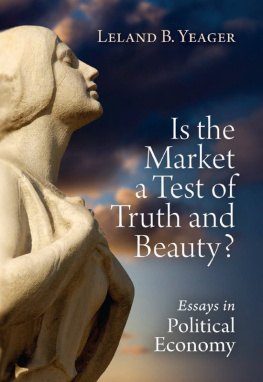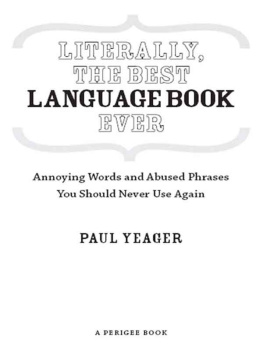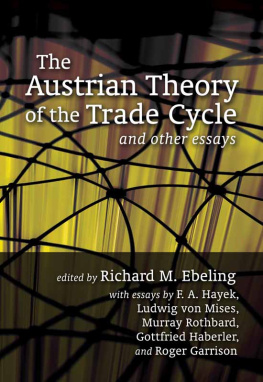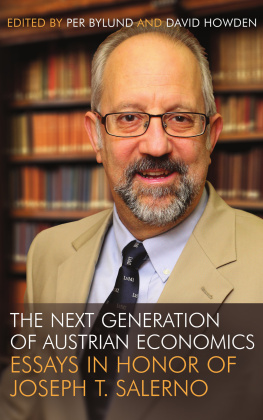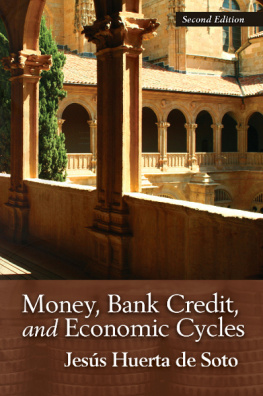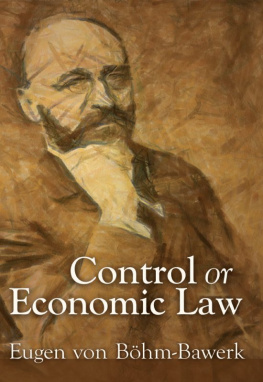IS THE MARKET A TEST OF
TRUTH AND BEAUTY?
Is the Market a Test
of
TRUTH AND BEAUTY?
Essays in Political Economy
by
LELAND B. YEAGER
Ludwig von Mises Institute

2011 by the Ludwig von Mises Institute and published
under the Creative Commons Attribution License 3.0.
http://creativecommons.org/1icenses/by/3.0/
Ludwig von Mises Institute
518 West Magnolia Avenue
Auburn, Alabama 36832
mises.org
ISBN: 978-1-61016-188-6
Contents
Introduction
This books title is the same as the newly chosen title of chapter 7, Is the Market a Test of Truth and Beauty? That chapter, along with the one before it, questions a dangerously false argument for the free-market economy sometimes made by its supposed friends. Their argument threatens to discredit, by association, the powerful and valid case for the market. Asked whether the market is a test of truth and beautyof excellenceAyn Rand would presumably give the same answer as mine: No, of course not! Consider her hero of The Fountainhead, Howard Roark.
Political economy is the area of overlap among economics, political science, and philosophy. Beyond its positive content, political economy does bear on policy but not only on policy; it is far from a hodge-podge of different peoples policy prejudices. Economics, when not disregarded, is obviously relevant to policy. So are philosophy and psychology, as when they underlie doctrines such as redistributionism and egalitarianism. Policy can affect economics. More exactly, a policy proposal may help clarify a strand of economic analysis even when, considering side-effects, the author does not actually recommend the policy; Land, Money, and Capital Formation, chapter 12, provides an example. Regrettably, though, policy-driven economists do exist who start with their or their employers preferred policies and then twist their analysis into supporting them.
Writings in political economy, being interdisciplinary, typically omit the deep technicalities of any specific field. Most of this books chapters are semipopular pieces that the attentive general reader should understand. They deal with intersecting fields rather than with advanced details of any one field. Left out of this book, then, are any of my relatively technical writings, as on monetary theory and international economics. A few semitechnical chapters, including numbers 1 and 12, come close to making an exception. Chapter 12 contributes to a field of particular interest to Austrian economists, capital theory. Yet it too strives for nontechnical language.
Some linkages among the chosen articles may not be immediately obvious. But, for example, Free Will and Ethics and Uchronia, or Alternative History both illuminate the chance aspects of life. So doing, both bear on political philosophy (as on the role of luck in personal status). Both also underline the difficulty of pinpointing the supposed deep parameters of the economy and so to making quantitative predictions, as opposed to what F. A. Hayek (1967) called pattern predictions. (Far be it from me, however, to say that the necessary achievements of the econometricians are forever downright impossible.)
About half of the articles deal with economics in particular. The Debate about the Efficiency of a Socialist Economy and The Debate Over Calculation and Knowledge are among them. The latter chapter summarizes points made more fully in my Mises and Hayek on Calculation and Knowledge, Review of Austrian Economics 7, no. 2, 1994, and in the ensuing debate with Joseph Salerno, Guido Hlsmann, Jeffrey Herbener, and Hans-Hermann Hoppe in 1996 and 1997 issues of that Review. That debate runs to too many pages for inclusion here (see the Reviews issues of 1994,1996, and 1997, online at the Mises Institutes website).
My Austrian Economics, Neoclassicism, and the Market Test, chapter 6, also provoked controversy, specifically from David Laband and Robert Tollison in the Quarterly Journal of Austrian Economics 3, no. 1, Spring 2000. The reader should read their article (at the Mises Institutes website) along with or before reading my reply in chapter 7.
Chapters on Macroeconomics and Coordination, The Keynesian Heritage in Economics, Hutt and Keynes, and The Image of the Gold Standard deal with money-macro topics. The last two of the Economics chapters concern methodology or, rather, countermethodology: they advise against being intimidated by narrow methodological preaching.
Several chapters in the Politics and Philosophy section examine the merits and demerits of democratic government. Two of them are book reviews. One of the books treats the American political system realistically. The other takes the George Stigler/Earl Thompson line thatif I may exaggerate just a bitwhatever institution exists must be optimal or at least satisfactory; otherwise it would already have been replaced. Other chapters in the section deal with political philosophy.
Most chapters are reprinted with only slight editing, particularly to standardize the system of references. Chapter 8 has been expanded (and renamed) to take account of developments in the fifteen years since it first appeared, and chapter 5 (also renamed) has been modified at its beginning to read less like an invited introduction to others articles. Several pages of chapter 25 have been cut out because they rebut a strained interpretation of Misess work that is hardly worth attention. Chapter 4, The Debate about the Efficiency of a Socialist Economy, although and perhaps especially because it dates from 1949, is printed unchanged.
The selection process has just happened to give the book an Austrian flavor not originally intended. The bulk of my work is not particularly Austrian. On whether I count as an Austrian economist, see the opening lines of chapter 6.
ACKNOWLEDGMENTS
For enjoyable and instructive discussions over many years, I am indebted to dozens, even hundreds, of students in my graduate Seminar in Political Economy at the University of Virginia and at Auburn University. (That seminar covered its topics in more scope, detail, and technicalities than the articles included here.) Many persons, including ones both mentioned and unmentioned in the individual papers, have given me valuable instruction, encouragement, provocation, and warnings. I hesitate to list names because any such list would be incomplete and would suffer from my lapses of memory; but it would include Roger Garrison, Luis Dopico, Daniel Edwards, Robert Greenfield, Roger Koppl, Juergen Backhaus, Steven Caudill, Warren Nutter, Edgar Browning, William Breit, Northrup Buechner, Murray Rothbard, James Buchanan, Gordon Tullock, and, to go back many years, Aurelius Morgner, James Waller, and Clarence Philbrook.
The Ludwig von Mises Institute made no suggestion that I moderate any views contrary to its own. For this and other reasons I am indebted to Llewellyn Rockwell, the Institutes chairman, and Douglas French, its president. Jeffrey Tucker, editorial vice president, encouraged and patiently supported this book project from the beginning. Perhaps the Institutes greatest support has been the services of Miss Lauren Barlow. She helped select the papers to reprint; standardized the system of citations (including placement of notes where they belong, at the bottom of each page); questioned errors, undue repetition, and infelicitous formulations; coped with many drafts; and gave invaluable support on the many arduous chores scarcely imaginable by someone who has not tried to assemble diverse articles into a coherent (I hope) book.
For these reasons I extend my special admiration and thanks to Lauren Barlow.
Next page
